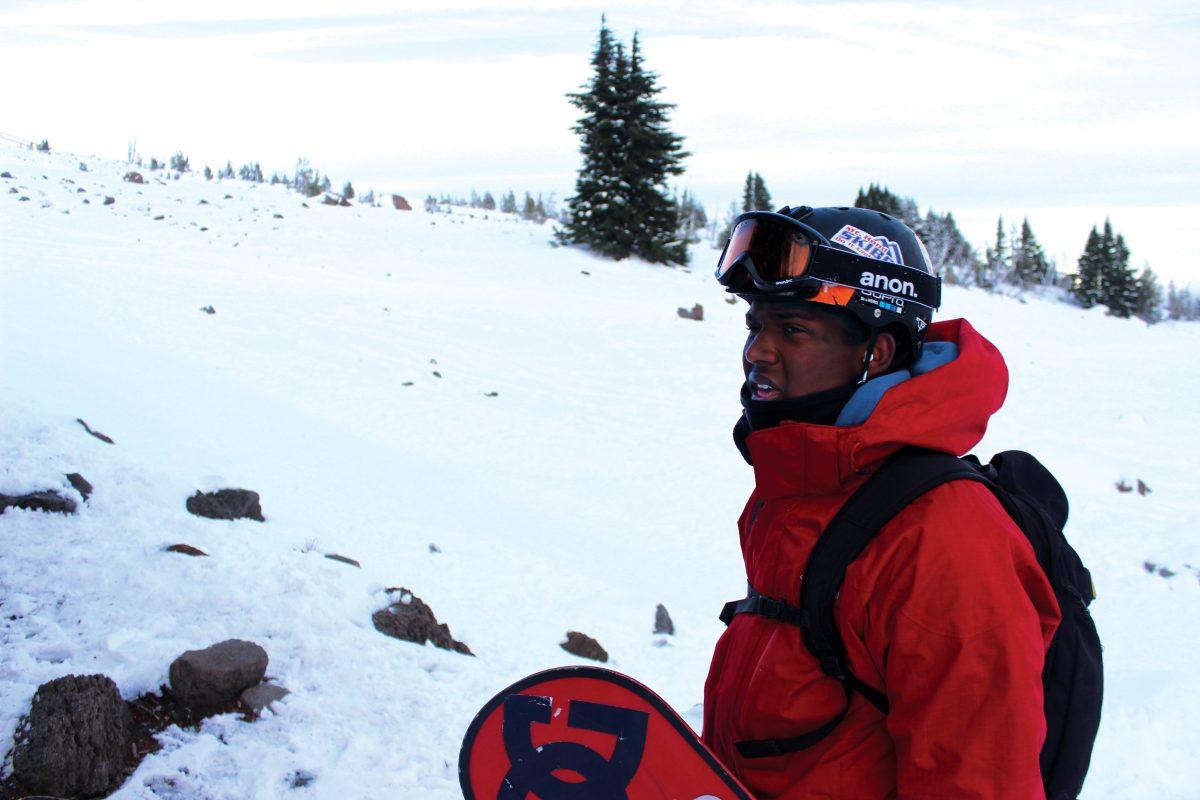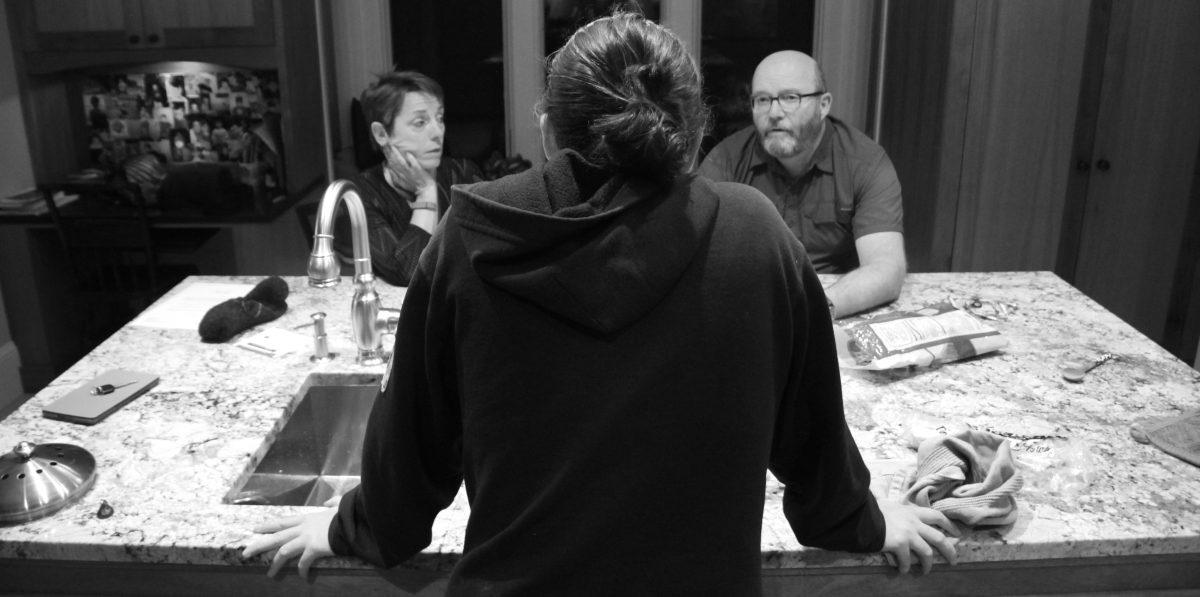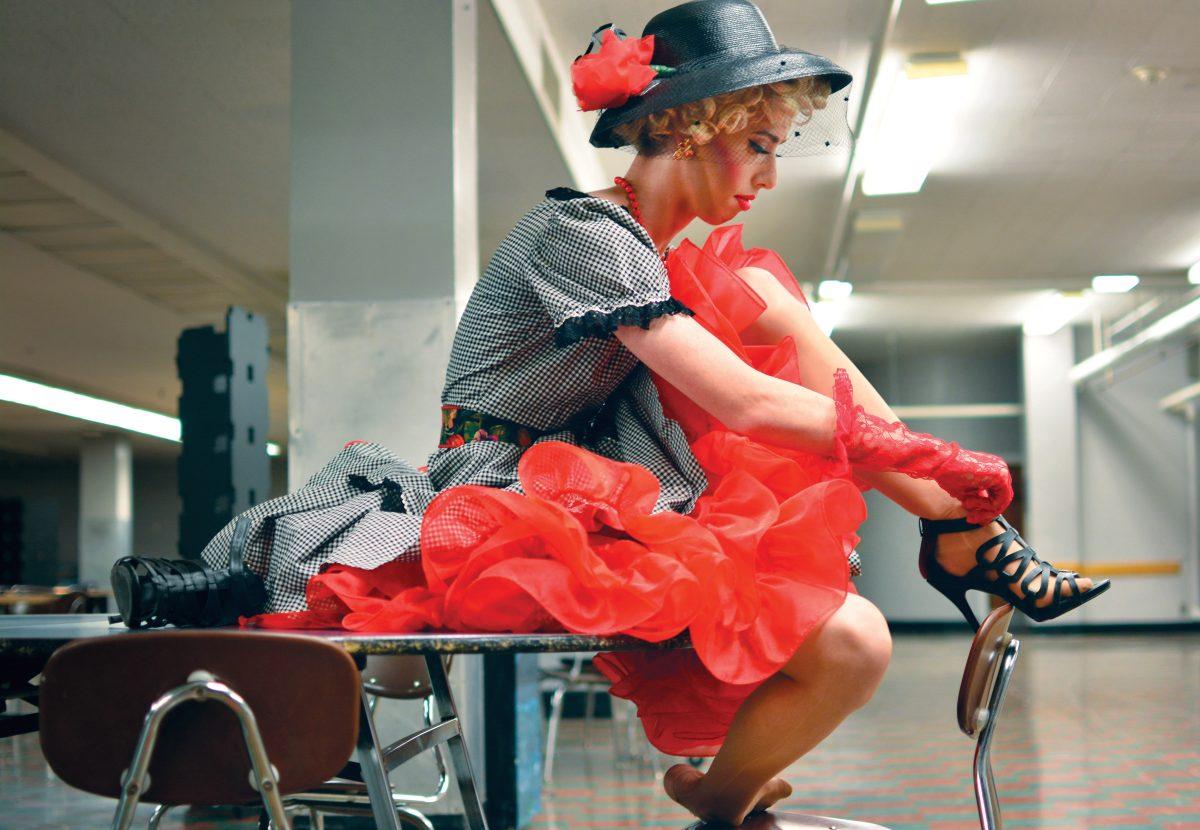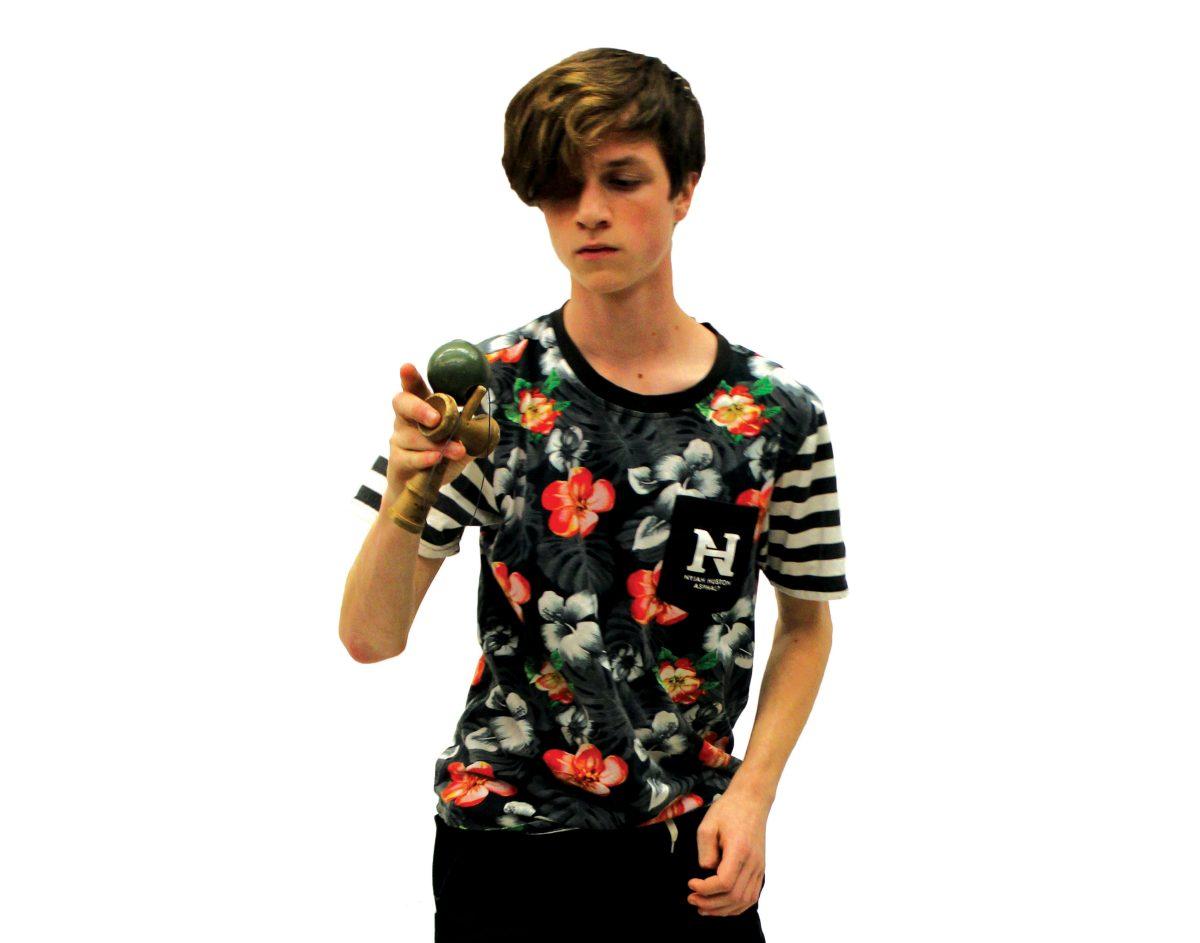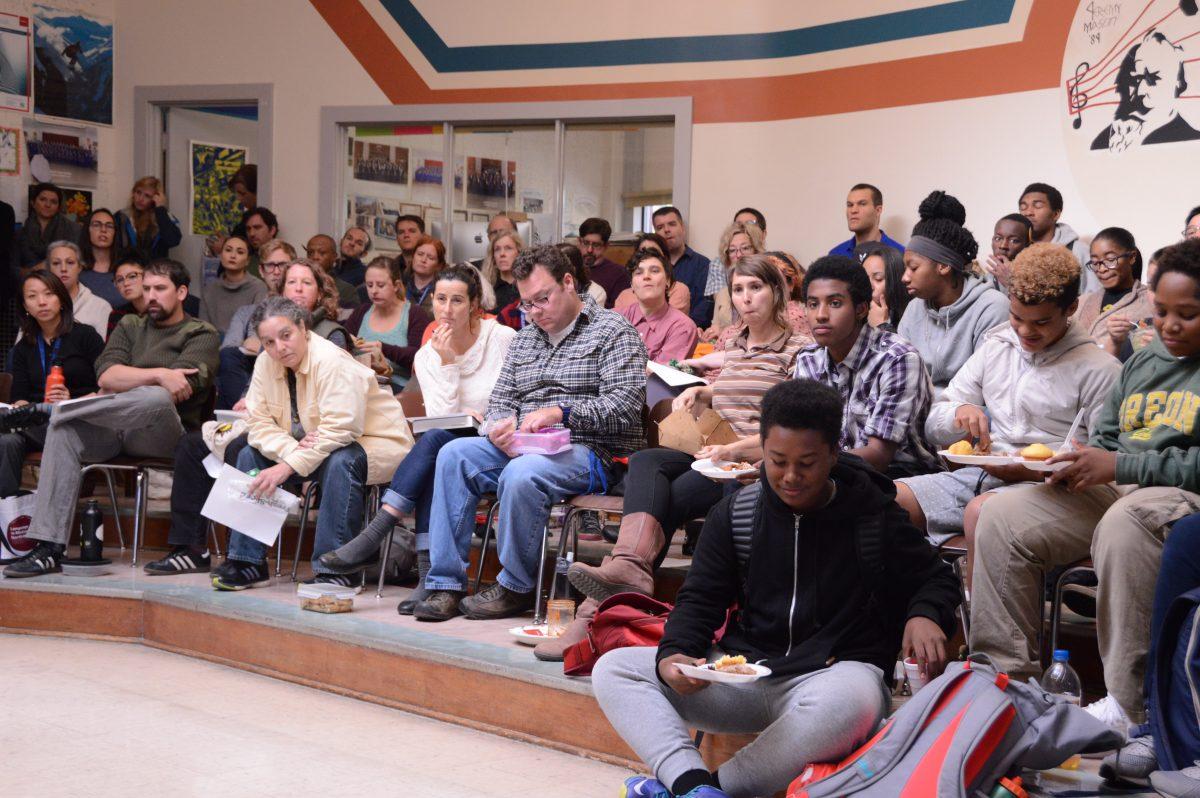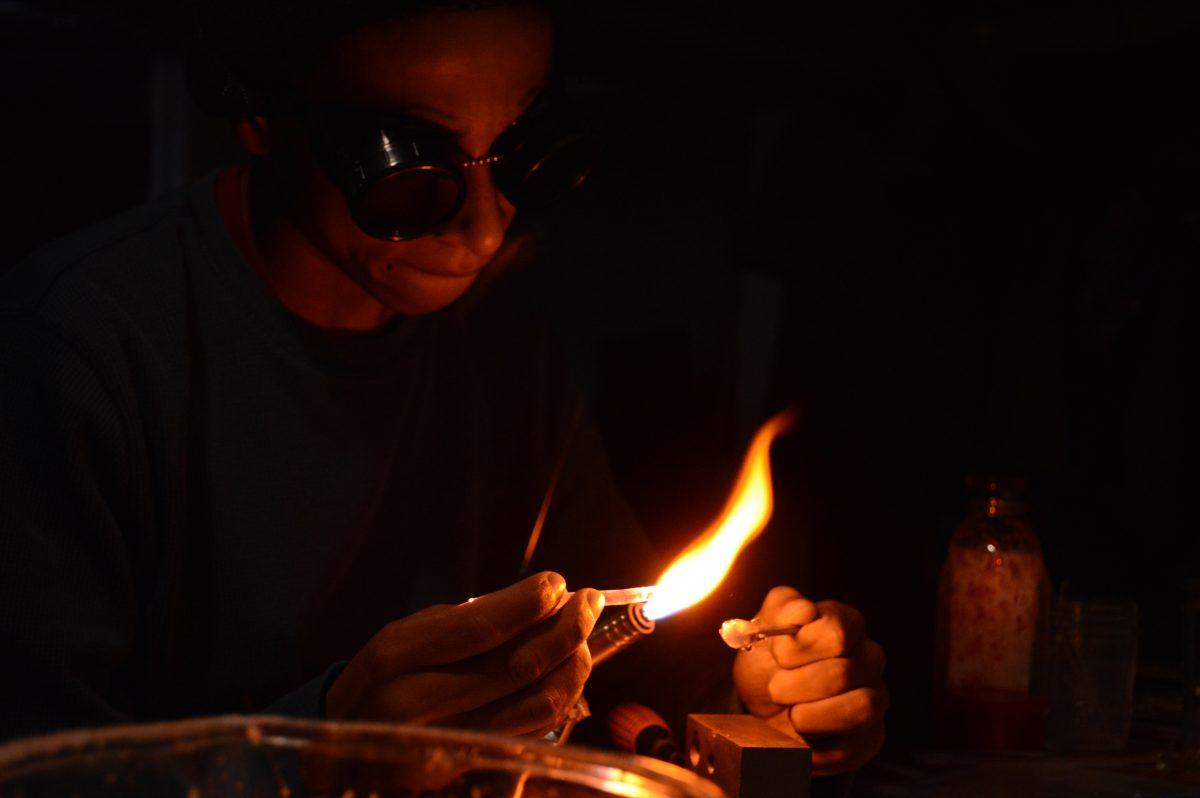On Monday nights, the G6 Trampoline Park in Southeast Portland is noisy, crowded with shoeless children as they take turns bouncing on giant trampolines, shrieking at each other from across the facility. It’s a little kid’s dream.
But for Grant High School senior Jordan Williams, it’s a training ground.
In the back of the facility, Williams flips, turns and swivels, bouncing on a low-level trampoline as his snowboarding coach Andy Pye stands nearby giving directions. It’s not the same as a snowboard, but it’s where Williams can simulate the tricks he’ll try on Mt. Hood this winter.
“It gets me comfortable with flips in the air, going through the motions,” says Williams.
When he was a kid, Williams split from the norm of traditional sports and fell in love with snowboarding. At the time, he was living in Atlanta where snow is a rarity. Williams turned to a new life in Portland to pursue his snowboarding dreams.
What makes Williams more of a rarity is that there are so few African Americans who participate in the sport. Browse through outdoor ski or snowboard magazines and it’s rare that you’ll see a black person.
Statistics bear this out. According to a 2013 study by SnowSports Industries America, African-Americans make up only 10.2 percent of snowboarders. By comparison, more than 67 percent of pro football players are black and pro basketball is 75 percent black.
Kelly Davis, the research director for SnowSports – a trade association that represents the suppliers of snow sports equipment – was one of the researchers who collected data for that study. “From a historical precedent, no, there haven’t been a lot of participants that happen to be African American,” she says. “That’s an area of opportunity for the industry, definitely.”
Williams has heard from others that he’s more fit for basketball or football. That’s only a motivator. Inspired by the African-American professional snowboarder Stevie Bell, Williams wants to become a role model for others. He also wants to show those who live in areas where snowboarding isn’t popular that they can do it.
“What I’m hoping and envisioning it to be is like just passing the torch to me,” he says. “Like I’m carrying it just a little bit further.”
Williams was born in DeKalb County near Atlanta on April 20, 1998. He has half-siblings, Janaé Williams and Austin Long, who lived in different areas in the South when he was growing up. Since he didn’t see them much, he didn’t have a strong relationship with them.
He lived in a primarily African-American neighborhood, with a nearby pond surrounded by a wooded area. “We were very outdoorsy,” says his mom, Beth Blumklotz. “We love to hike, go to the beach. That’s just been kind of his lifestyle.”
His childhood was a mixture of sports, school and family. But Williams says he felt sheltered. “I was happy because I didn’t know what was out there,” he says. “I didn’t really know about different opportunities just because I was young; I didn’t have the understanding that I have now.”
His mother played soccer and swam throughout college, and his father has coached football for years. Williams has memories of throwing a football around with his dad on the side of his house.
“I was pretty much just ushered into football,” says Williams, who began playing the sport at age 5.
Snowboarding wasn’t on his radar then. Daytime temperatures hardly ever drop under 50 degrees in Atlanta, so snow rarely falls. It wasn’t until he visited family in Portland that he was introduced to the sport. He remembers watching it on TV in his grandma’s house. “I saw them doing all the cool tricks and like 360s and going off jumps,” recalls Williams.
He was hooked. But the frequent trips to Portland to visit relatives on his mom’s side didn’t include trips to the mountain. Williams was left to fantasize about the sport.
Back in Atlanta, Williams lived as an only child. His mother says he often had to entertain himself. He made forts out of cardboard, sometimes keeping them up for weeks.
“I like the feeling I feel for building or doing whatever myself, and then when you complete it,” Williams says.
He later started designing snowboards by drawing them on cardboard and cutting them out. When it did snow in Atlanta, he used a skateboard, hoping to get a slice of what it felt like to speed down a mountain.

His mother, aside from some part-time work, was primarily a stay-at-home mom. She home-schooled Williams for first through third grade before sending him to a series of mostly private schools.
In eighth grade, Williams’ parents divorced and he had to learn again to adapt to new environments. Throughout it all, sports remained a constant.
He played golf, baseball and soccer for a few years each, and swam competitively in middle school. He played football until he was 14. “Football and basketball were like pretty big, and so if you weren’t doing that, you pretty much weren’t getting out of there,” says Williams of his home in Atlanta.
WhenBlumklotz decided to move back to Portland, Williams stayed behind with his father. Despite their occasional differences, they have a good relationship today.
“We have a great father-son relationship,” says his dad, Jeff Williams. “Sometimes like big brother to little brother, as well…I think the relationship that we have, he can tell me anything.”
Williams still visited his mother during the holidays and some long weekends.
During one visit in November, Jordan Williams finally got to experience the sport he had been longing to try. The icy consistency of the snow wasn’t ideal, but that didn’t matter to him. “Even though I was a little bit tired, you could still see how excited I was,” he recalls. “It (felt) like I was a little kid again.”
After his first time riding, Williams was eager to learn more about the sport. Among his friends, he became known as the guy who snowboarded. “It just made me feel cool because I was the only person they knew that snowboarded,” says Williams. “All the information that they were getting about snowboarding was kinda through me.”
Whenever Williams visited his mother, trips to Mount Hood were a ritual.
“I would fly four hours, get in at maybe 10 or 11 o’clock at night, be up at 6, get dressed, be on the mountain by 8, just for the weekend,” says Williams.
In 10th grade, he also found Pye, the private coach. Williams called Pye when he was in Portland and they’d arrange a time to meet on the mountain.
Most of Williams’ friends in Atlanta supported his passion. But some people, mainly adults, gave him a hard time. “They were like, ‘You want to be a snowboarder? Dude, you’re black, you’re not gonna be a snowboarder. What black person snowboards?’” Williams remembers hearing.
It’s a question he’s always fought against.
“I don’t see why a color or a race would have to define a sport,” he says. “I mean if you wanna do it, and you’re good at it, why don’t you just do it?”
That same year, Williams began toying with the idea of moving up to Portland. In Atlanta, he felt limited. “I would wake up, go to school, come home, and then like basically do nothing until football season came around,” he says. “Football was the only exit I had.”
Pursuing snowboarding seriously was nearly impossible living in Atlanta. He was still taking trips to Mt. Hood when he visited his mom, but that wasn’t enough.
“The advantages are phenomenal,” says Pye. “I mean you really can’t snowboard without travelling long distances…when you’re in Atlanta. The mountains aren’t the same.”
Williams also wanted to spend the last two years of high school with his mom. After spending the first two with his dad, he was ready for a change of pace. His father, who wanted Williams to play football, was unhappy with the move, Williams says.
“(He) tried to fight it the whole way,” says Williams. But Williams stressed it would be better for his future, and eventually his father granted him the permission to go.
Williams was in for a culture shock when he came to Portland to live. Minorities in leadership positions are few, and when he walked down the sidewalk, some people crossed to the other side. It was opposite from his experiences in Atlanta.
“I would walk around and I wouldn’t get followed in the mall…I wouldn’t get followed in the Walmart,” he says of Atlanta. “But here almost every time I get followed by a security guard when I’m in Lloyd Center.”
Williams’ mother also recognizes the difference in racial demographics between the two cities. “All of our neighbors were African-American (in Atlanta),” says Blumklotz. “He saw African-American business owners…his doctors, his teachers, they looked like him…So now coming here, I have to remind him, you can still be any one of those things.”
But for Williams, it was a trade-off.
Grant, a school with only a 13 percent African-American student population, was also a new experience for him. Making friends was easy, as he already knew some people from visiting Portland so often, and he had a few cousins in the Portland area.
He joined the Black Student Union during his first year at Grant. “Being in the BSU really opened my eyes to a lot of the problems in the African-American community,” he says.
He joined the snowboard team and the baseball team. He also developed a more constant training schedule with Pye.
But during the state competition, Williams didn’t place in any of the events. He remembers feeling defeated. “I was kind of at a point where I was like, ‘Well maybe I should go back to football and focus on that,’” says Williams.
Around the same time, Williams was watching a snowboarding clip and found out about Bell, the professional snowboarder.
“He’s a snowboarder, but he’s not one of the big name athletes,” says Williams. “And I want to be at that level.”
Since then, his goals of reaching the professional level with the sport have been set. Over the summer, Williams rediscovered a binder with some snowboard designs from when he was younger. “I was like, ‘I can do this now,’” he says.
So he and his friend, Roland Hill, a snowboarder at Cleveland High School, started a company building snowboards. His cousin, Juwan Curtis, and friend, Chris Drannon, who lives in Atlanta, also work for the company.
He hopes to eventually sell T-shirts, hats and jackets, featuring their company’s name, JAR Snowboard Co. He also took up a job at G6 Airpark. His schedule varies week to week.
After a two-year break from football, he decided to join the Grant team this year. While he says he doesn’t have the same passion for it as snowboarding, it’s still a sport he loves.
As of now, his future involves two different routes. He’s made a goal for the state snowboarding competition that will occur in spring. “I made a deal with my dad that if I podium at every event this year, I will focus on snowboarding,” he says. “But if I don’t get top 5 in every freestyle event this year, then I’ll take the football route.”

That would mean he’d play football at a college, potentially the University of Kansas, Portland State University or Southern Oregon University, Jordan says.
But even if he goes through with the football route, he’ll keep pursuing his company.
If he performs well at state in snowboarding, his plans will involve the winter sport right out of high school, training with his coach, going to competitions across the U.S., and potentially getting picked up by a sponsor.
Pye believes he has what it takes. “Jordan does have the drive and the motivation,” Pye says. “In my opinion, that’s the biggest piece of the puzzle. If he keeps working on it…and he’s able to step up his training days…I think it’s very possible.”
Farther in the future, Williams wants to give kids in the South more opportunities to snowboard by taking them on trips to nearby mountains and creating “dry slopes” for them to practice on.
Blumklotz wants all doors to be open for her son’s post-high school options. “There’s a lot of pressures nowadays to do certain things, and you may not want to do that for the rest of your life,” she tells him.
But she also wants her son to do whatever makes him happy, and he makes it clear that that’s snowboarding.
“All my friends at home, they may watch it or flip to it and be like, ‘Oh that’s pretty tight.’” Williams says. “But they’re not really that interested…because they think it’s a white person’s sport. And I (want) to be like, ‘Well, you can do it, too, just like how I did it.’” ◊





























